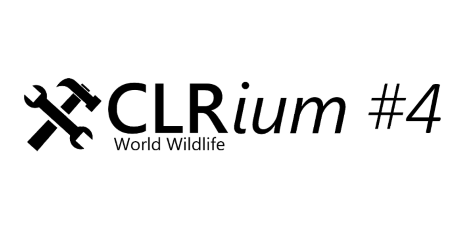Meet the .Net community at CLRium # 4 + online. Where CoreCLR and C # are moving. All are invited
 I do not like the jaded word "conference". This is a meeting of developers with common interests who want to hear about the future of their favorite platform, as well as tricks that allow you to bypass the rules set in the .NET Framework. The meeting format is ten slots that are filled only with the most modern, sometimes even not yet released functionality. This is the very format when there is no need to fill the grid with reports that have nothing to do with the topic of the conference. Set: there is a dense work on the screening of non-perspective topics not related to our platform.
I do not like the jaded word "conference". This is a meeting of developers with common interests who want to hear about the future of their favorite platform, as well as tricks that allow you to bypass the rules set in the .NET Framework. The meeting format is ten slots that are filled only with the most modern, sometimes even not yet released functionality. This is the very format when there is no need to fill the grid with reports that have nothing to do with the topic of the conference. Set: there is a dense work on the screening of non-perspective topics not related to our platform.
I hope there are still past versions of CLRium in your memory. I remember, and from time to time I glance at your numerous responses, which warm my desire to hold everything once again. And this time - with a bias in the future. And I have a spoiler for the future: the .NET Framework will be closed for the sake of the Core CLR . Why? Come and for the price of one refueling car you all know for yourself.
Why do I invite everyone? The topics of the meeting are all like a selection and allow you to plunge into the present of our opensource platform. Honestly, I would go myself: analyze the evolution of CoreCLR functionality: from 2.0 from 3.0, debugging using a self-written debugger , the richest and most controversial features of C # 7. *, 8.0, Garbage Collector API , new means of providing controllability of unmanaged resources and much more .
Read and register

- Link to registration in St. Petersburg + online , October 19
- Link to registration in Moscow , October 26
 Sample articles and a full list of topics of speeches - under the cut
Sample articles and a full list of topics of speeches - under the cutReports (not all):
 From revolution to evolution: CoreCLR and new features of the platform
From revolution to evolution: CoreCLR and new features of the platform
Warm-up report on the recently released and not yet released features. NET Core. After listening to it, you can form a general opinion about where we are going, what you should pay attention to, what to try, and what to put on the shelf.
 Span <T>, Memory <T>
Span <T>, Memory <T>
New data types that are not afraid of the word revolutionary. Indeed, in addition to the unification of working with arrays, strings, and unmanaged data buffers, they additionally legalize many unsafe operations. We will learn from the report: why they were introduced, for what tasks, how quickly they work and on which platforms, and also we will start to treat unsafe code more calmly, because that will become safe and manageable. In general, I strongly advise: a detective with a happy ending.
 Memory: MemoryHandle, MemoryManager, MemoryPool
Memory: MemoryHandle, MemoryManager, MemoryPool
In this report, we will continue the conversation about memory, going into more practical examples and techniques: we will consider new opportunities for renting arrays, data buffers. We will get acquainted with the new concept of ownership of the memory site. And in general, we are preparing to accelerate our algorithms with new methods. After all, while we wait, leading developers are already using the new functionality with might and main: this is the Castle Project and System.IO.Pipes and many others
 Garbage Collector API
Garbage Collector API
The garbage collector is now replaceable. For this, it would seem that all that is needed is to implement the appropriate interface. The report is intended to show and tell about the new API, its capabilities and new approaches that we need to remember for the future (which, as usual, comes suddenly). And also, in general terms - what awaits us in this very future. In other words: what is the GC API and why do we need to know about it?
 Global Tools and Command Line Interface API
Global Tools and Command Line Interface API
One of the most powerful, unambiguously necessary and not clear questions: Global Tools and Command Line Interface API. In short, a means of building cross-platform commands for the command line of .NET projects. Let us take a closer look, examine the ready-made examples (they are already fully integrated into the products) and decide: where it is needed, and when you just remember its existence - for the future
 ClrMD: developing your own debugger (it's very simple!)
ClrMD: developing your own debugger (it's very simple!)
There is an interesting library for debugging processes and memory dumps.
And the best part is that this library is written in the usual for
.NET. This means that you can investigate the problem by developing scripts to search for problem areas of the application. This will often speed debugging. We will understand how this is done.
A couple of words about the speaker
All reports currently in the grid are read by one speaker:
 Stanislav Sidristy
Stanislav Sidristy
An experienced speaker at various conferences and meetings and the author of the online book  CLR Book: under the hood of the .NET Framework .
CLR Book: under the hood of the .NET Framework .
He worked in such companies as Epam Systems, Luxoft, Kaspersky Lab, implementing tasks of various levels of complexity in C #, Groovy, C / C ++ and other languages.
Did you miss something important?
If you think we missed something, write in the comments, what else to tell =)
Contacts:
 sunex.development@gmail.com
sunex.development@gmail.com .NET Community Meeting Site
.NET Community Meeting Site +7 (921) 948-16-08
+7 (921) 948-16-08
Price - 3,000 rubles. For my car, this is a half filling.
